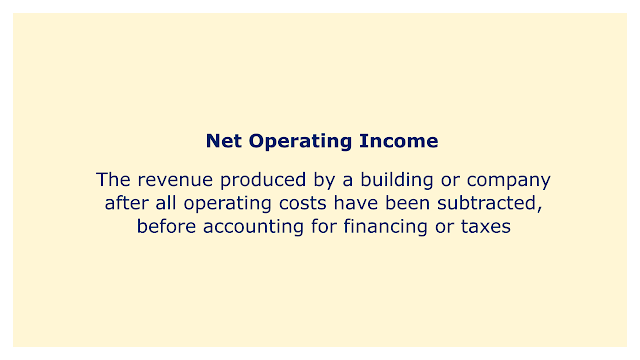 |
| Image: Moneybestpal.com |
Net Operating Income (NOI) is a financial indicator that shows the revenue produced by a building or company after all operating costs have been subtracted, before accounting for financing or taxes. It is frequently applied in the real estate sector and serves as a gauge of a property or company's profitability.
The net operating income (NOI) of a property or company is computed by deducting all operating costs from the gross revenue of the asset. These costs include real estate taxes, insurance, maintenance, and property management fees. The NOI is the tally that results.
A rental property's NOI, for instance, would be $70,000 per year if its total annual rental revenue was $100,000 and its annual operating expenditures, which include property taxes, insurance, and maintenance costs, were $30,000.
NOI is significant since it offers a gauge of a property's or company's profitability and capacity for generating income. Real estate analysts and investors use it to assess a property's or portfolio of properties' performance and make investment decisions.
The capitalization rate, which is derived by dividing the NOI by the property's value, and other significant financial measures for real estate are likewise based on NOI. The probable return on investment for a particular property is calculated using the cap rate, a crucial indicator for valuing commercial real estate investments.
The profitability of a building or company can be considerably impacted by financing expenses and taxes, which should be kept in mind as NOI does not account for these. As a result, to obtain a complete picture of the financial performance of the asset or company, it should be assessed in conjunction with other financial measures, such as cash flow and return on investment.
A rental property's NOI, for instance, would be $70,000 per year if its total annual rental revenue was $100,000 and its annual operating expenditures, which include property taxes, insurance, and maintenance costs, were $30,000.
NOI is significant since it offers a gauge of a property's or company's profitability and capacity for generating income. Real estate analysts and investors use it to assess a property's or portfolio of properties' performance and make investment decisions.
The capitalization rate, which is derived by dividing the NOI by the property's value, and other significant financial measures for real estate are likewise based on NOI. The probable return on investment for a particular property is calculated using the cap rate, a crucial indicator for valuing commercial real estate investments.
The profitability of a building or company can be considerably impacted by financing expenses and taxes, which should be kept in mind as NOI does not account for these. As a result, to obtain a complete picture of the financial performance of the asset or company, it should be assessed in conjunction with other financial measures, such as cash flow and return on investment.
